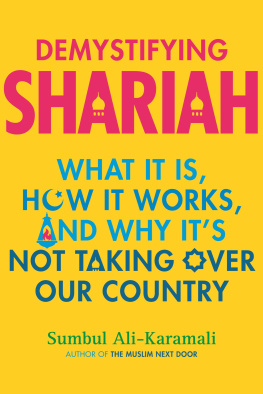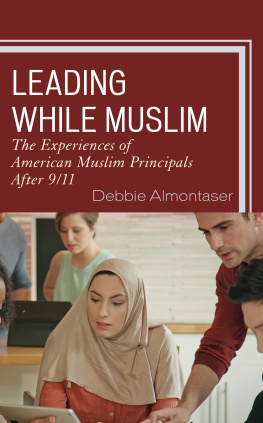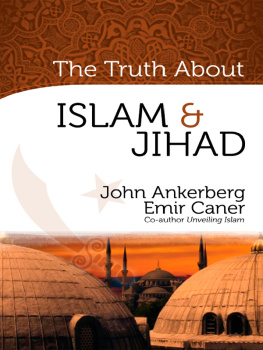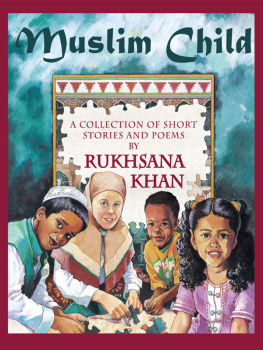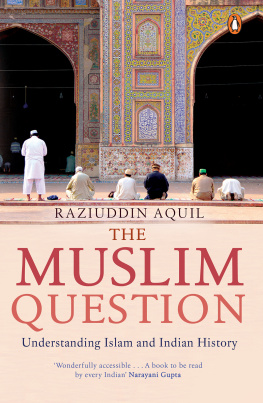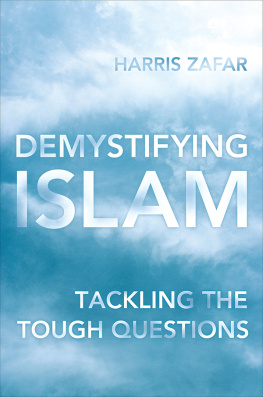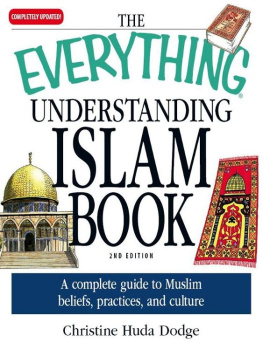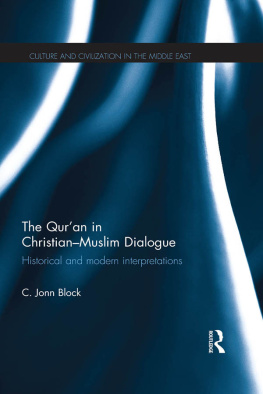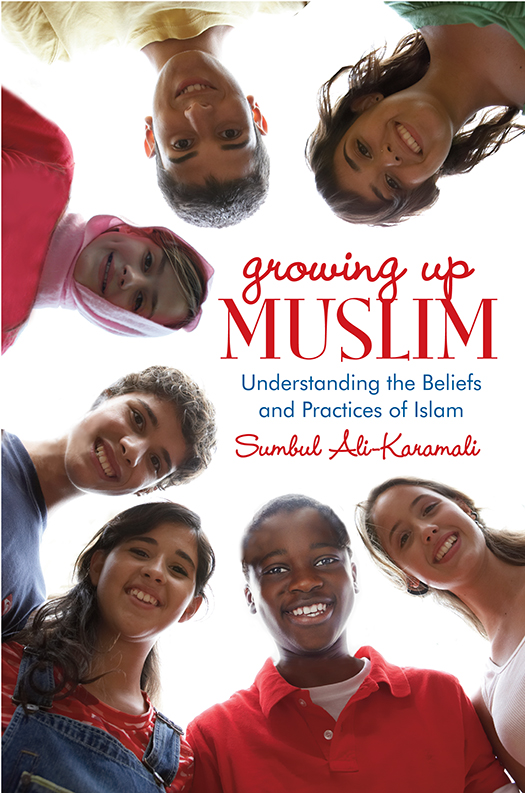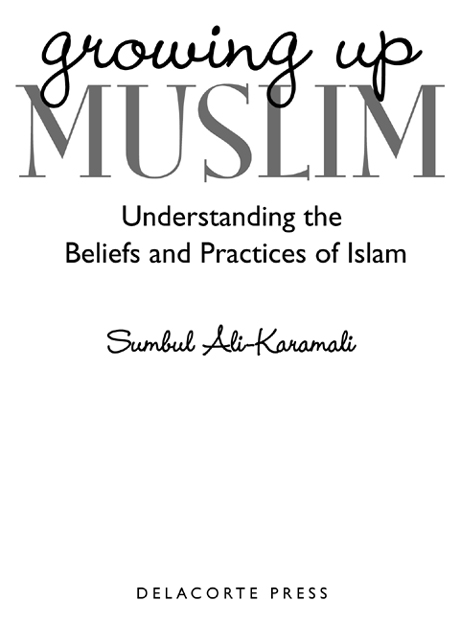Praise for
GROWING UP MUSLIM
This is a wonderful book about Islamknowledgeable, approachable, and inspiring. By telling the simple truth about the strength she gains from her faith, Sumbul Ali-Karamali brings to life how being a better Muslim helps her be a better American.
E BOO P ATEL , Founder and President of Interfaith Youth Core and author of Sacred Ground
The perfect guide for the young person trying to figure out what it means to be a Muslim in this day and age.
R EZA A SLAN , author of No god but God
Sensible, accurate, and engaginga much-needed corrective to ignorance and misinformation about Islam and Muslims.
K ECIA A LI , Associate Professor of Religion and Director of Undergraduate Studies, Department of Religion, Boston University
The author offers an exceptional introduction to Islam by demonstrating the diversity among Muslim practices and beliefs. As the author demonstrates repeatedly, Muslims share a common set of reference points that they use to orient their attitudes and actions, but they interpret these through various cultural and community lenses, just as Jews and Christians do.
P ETER G OTTSCHALK , Professor of Religion, Wesleyan University, and coauthor of Islamophobia
Growing Up Muslim is a must-have for all school libraries. The book is informative, yet written in a fun, energetic way, with personal experiences and viewpoints. I highly recommend this book.
P ETER D OERING , Supervisor of Library Services, Santa Clara County Office of Education
Every kid of any religion could use a wise but not preachy Gandalf or Dumbledore. Sumbul Ali-Karamali is smart, hip, and funny and does not settle for being holier-than-thou. I most enthusiastically recommend Growing Up Muslim as an accessible but never simplistic resource on Islam for all young people, whatever their religion.
D R . O MID S AFI , Professor of Religion, University of North Carolina at Chapel Hill
Sumbul Ali-Karamalis book is bound to captivate young audiences seeking reliable and nuanced answers about living life as a committed Muslim in the U.S. and elsewhere. This is a truly unique work that is enthusiastically recommended!
A SMA A FSARUDDIN , Chair and Professor, Department of Near Eastern Languages and Cultures, Indiana University
Copyright 2012 by Sumbul Ali-Karamali
Jacket art copyright Michael Blann/Getty Images
All rights reserved. Published in the United States by Delacorte Press, an imprint of Random House Childrens Books, a division of Random House, Inc., New York.
Delacorte Press is a registered trademark and the colophon is a trademark of Random House, Inc.
Visit us on the Web! randomhouse.com/teens
Educators and librarians, for a variety of teaching tools, visit us at randomhouse.com/teachers
Library of Congress Cataloging-in-Publication Data
Ali-Karamali, Sumbul.
Growing up Muslim : understanding the beliefs and practices of Islam / Sumbul Ali-Karamali. 1st ed.
p. cm.
eISBN: 978-0-375-98340-5
1. IslamJuvenile literature. I. Title.
BP161.3.A385 2012 297dc23 2011045056
Random House Childrens Books supports the First Amendment and celebrates the right to read.
v3.1_r3
For my children
Contents
Part I
Muslim Beliefs and Practices
(or, What Its Like to Grow Up Muslim in California)
Part II
When Did Islam Start and How Did It Develop?
Part III
Modern Muslim Demographics

Part I
Muslim Beliefs and Practices
(or, What Its Like to Grow Up Muslim in California)

Starting with the Basics: What Do Muslims Eat?
I f human beings have one thing in common, whether they are from Switzerland or Swaziland, whether they are Aborigines or Aleuts, its food. It may not be what makes us human (after all, reptiles eat food, too), but it certainly often defines how we live. Food was also the only reason I ever had to talk about religion when I was a kid.
Growing up in Southern California, I almost never talked about being Muslim. None of my elementary school classmates talked about religion, and neither did I. After all, who talks about religion at recess? It wasnt relevant to playing on the playground or doing my homework or going to birthday parties. It just never came up.
Except when it came to food.
The only time I ever had to talk about being Muslim in elementary school, or even middle school, was during the occasional birthday party or playdate when the only food available was, for instance, pepperoni pizza. And then Id have to explain that I couldnt eat the pepperoni pizza because pepperoni was pork and I didnt eat pork because I was Muslim. Then Id have to explain what being Muslim meant.
Once in a while, being Muslim came up in the classroom as well. I remember when, in seventh grade, we began the study of China in my social studies class. One day, a classmates mother, who had immigrated from China, brought wontons for the class to taste. She had made the wontons herself. She handed me a wonton nestled in the sort of stiff brown paper napkin that seems to be standard in every classroom. I had never tasted wontons, but I liked trying new foods. I saw that this bite-sized object looked like it was made of some type of dough, and I popped it into my mouth.
As I chewed thoughtfully, I heard a classmate ask the mother, Whats inside it?
Its pork, she said, passing by my desk.
I froze. Pork? There I sat, with a mouthful of pork? My religion did not allow me to eat pork! I was afraid to chew it, and I was afraid to swallow it. But I couldnt spit it out, either, because that would have been unthinkably, horrendously rude, and my parents had always stressed politeness. What could I do? I sat for a few minutes in my chair, my eyes filling with tears and my mouth full of pork, until I finally gave up and swallowed. I spent the rest of the class period terrified that I would throw up.
That night, I couldnt sleep. Finally, I padded out into the living room, where my parents were watching television, and I told them the whole guilty story. My father laughed and told me that God would forgive me.
Making a mistake is not a sin, he said, and yes, I know you realized it was pork and you swallowed it anyway. Its over now, and you did your best. Go back to sleep.
Food is just about the most universal of subjects. We welcome people to our houses with food, build our social lives around food, celebrate with food, and obviously cannot survive without food. It stands to reason, then, that religions might have something to say about food as well.
Many religions set down food guidelines. The guidelines are sometimes periodic (like not eating meat on Fridays) and sometimes permanent (like never eating pork). Islam, which is the religion Muslims follow, contains a few guidelines as well.
The Quran, which is the Islamic holy book, tells Muslims not to eat pork or drink alcohol. These are the two best-known prohibitions, and many people have heard of them already. But they arent the only two.


